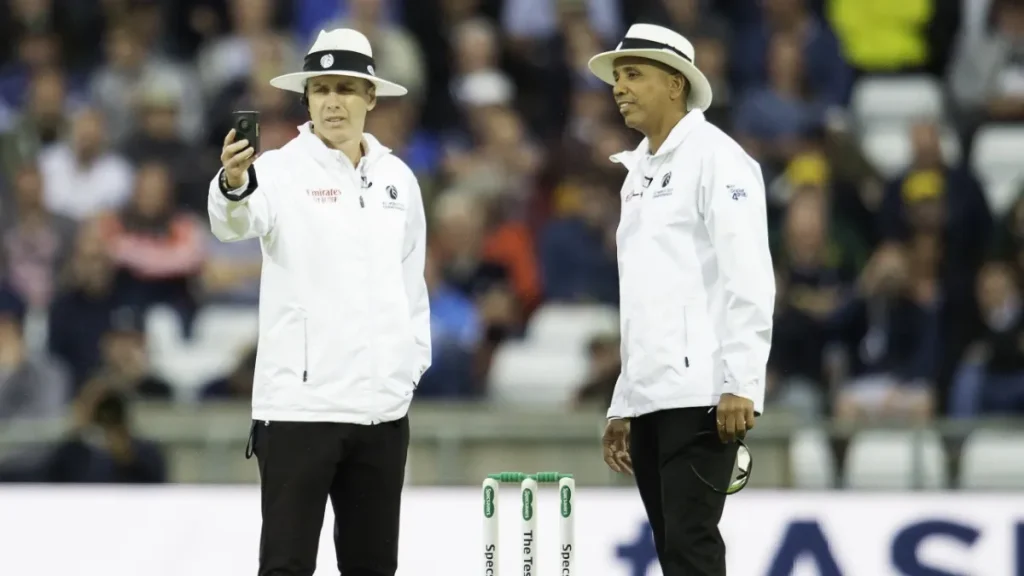Cricket Umpire vs. Referee : Which One Is It?
In the complex and nuanced world of cricket, two key officials are responsible for upholding the rules and integrity of the sport: the umpire and the match referee.
What is the Difference between Umpire and Referee in Cricket?
While they are both authority figures, their roles and responsibilities are distinctly different. Understanding this difference is essential for any fan or player who wants to grasp how the game is governed.

What do the Umpires do in Cricket?
An umpire is the primary official on the field of play. Their job is to enforce the Laws of Cricket and make real-time decisions that affect the course of the match. There are multiple umpires in a modern cricket game, each with a specific function.
The On-Field Umpires
During a match, two umpires are positioned on the field. They start their duties before play even begins by inspecting the pitch and ground to ensure they are fit for the game. Once play is underway, their tasks are numerous and critical.
They count deliveries and overs, signal runs and boundaries, and, most importantly, they make decisions on appeals for dismissals. This includes a wide range of judgments, from an LBW (Leg Before Wicket) appeal to a run-out or stumping.
Their rulings on illegal deliveries, such as wides and no-balls, are also vital for the game’s progress. In short, the on-field umpire is a dynamic, active participant who ensures the match unfolds according to the rulebook.
The Third Umpire
With the advent of technology in cricket, the third umpire or TV umpire has become a crucial part of the officiating team. Positioned in a separate room with access to television replays and specialized technology like ball-tracking, their role is to support the on-field umpires.
The third umpire adjudicates on close calls that are referred to them, such as tight run-outs and stumpings , or disputed catches.
They also play a central role in the Decision Review System (DRS), where players can challenge an on-field decision. If an on-field umpire is injured or incapacitated, the third umpire can also step in to replace them.
What does the Match Referee do in Cricket?
In contrast to the umpire’s on-field duties, the match referee operates from a supervisory position, often off the field. Their primary role is to ensure the match is played in the spirit of the game and to enforce the ICC (International Cricket Council) Code of Conduct.
The Referee’s Role in Discipline and Oversight
A match referee is the ultimate judge of player behavior and discipline. While they do not make decisions during the match, they closely monitor the game for any transgressions.
If a player or team shows dissent toward an umpire, engages in unsportsmanlike conduct, or violates any other part of the Code of Conduct, the referee has the authority to apply sanctions.
These can range from fines to suspensions and are typically handed down after the match has concluded. This system allows the game to flow without interruption while still holding players accountable for their actions.
Other Key Responsibilities
Beyond disciplinary matters, the referee also oversees the official coin toss before the game. At the conclusion of the match, they are responsible for filing a comprehensive report to the ICC.
This report details not only any disciplinary issues but also includes an assessment of the playing conditions, such as the quality of the pitch. This feedback is critical for the long-term management of venues and the sport itself.
A Unique Partnership
While their jobs are separate, the umpire and referee work together to ensure the integrity of a cricket match. The umpire’s immediate, on-field decisions are supplemented by the referee’s overarching disciplinary authority.
This unique two-tiered system of governance is a hallmark of cricket, setting it apart from other sports where a single referee or official might manage all aspects of the game. It ensures that the match is not only fair and rule-abiding but also conducted with respect and discipline.

Rivcky John
A prominent figure in sports journalism for the last two decades. Cricket Analyst & Writing News, Features, Match Previews/Reviews/Reports, And Opinion Pieces on Cricket. You can connect with him on Facebook also.
